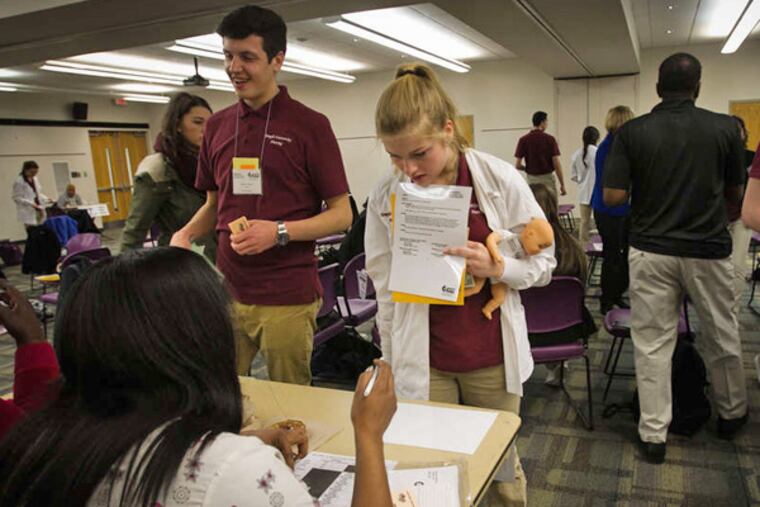Nursing students learn about ways poverty affects health
For first-year Temple nursing students, a recent classroom session on how to cover rent, child care, food, medicine, and transportation on a bare-bones budget was an academic exercise.

For first-year Temple nursing students, a recent classroom session on how to cover rent, child care, food, medicine, and transportation on a bare-bones budget was an academic exercise.
But for many of their patients, that simulation symbolizes brutal reality.
In Philadelphia, a staggering 28 percent of residents live in poverty. For many, deprivation also means a life of poor health. Without decent housing, access to medical care, healthful food, and safe exercise outlets - and with the stress that comes with deprivation - the poor face major hurdles to getting and staying well. So nursing programs such as Temple's are spending more time on what academics call the "social determinants of health" to make a real impact on patients' lives and health.
"While every client faces challenges in regards to their own healthy lifestyle, clients living in poverty have to face on a daily basis the shortage of money which causes a large amount of stress," said Patricia DiGiacomo, assistant chair of the nursing program at Temple.
"Our students need to have a greater awareness of poverty," said Michael McIntosh, a professor in the program. "It's important for them to understand that their patients didn't come from a vacuum. They need to be aware of what's happening in a patient's life and understand where they're coming from."
At the University of Pennsylvania, nurses are taught how to have difficult conversations, including how to get to the bottom of why people skip medications and doctor's appointments.
The course starts with a tour of West Philadelphia to help students "think beyond stereotypes, capitalize on the strengths, and see exactly what the community needs," said Cynthia Connolly, co-faculty director of the Field Center for Children's Policy at Penn.
Numerous academic studies show poverty itself is a risk factor for disease.
"Students need to recognize how poverty puts up barriers to good health and nutrition and leads to chronic cumulative stress," said Temple nursing professor Monika Jelic. Stress not only can lead to higher blood pressure and insomnia, it also can weaken the immune system, she noted.
Students involved in the poverty simulation at Temple seemed to get the message.
"It's important," said Michael Kapral, 20, of Dallas, Pa. "A huge part of [nursing] is to relate to them and give patients the care that they deserve."
Nurses often are ideally positioned to help patients make meaningful lifestyle changes to tackle tough problems such as hypertension.
"In a lot of primary care practices, there isn't time to teach how to eat right or exercise or take medications correctly," said Dorothy Alverango, a nurse practitioner and Temple graduate student working with patients in West Philadelphia. "Programs need to be tailored to take into account factors of poverty, including health education."
Understanding poverty can also lead to greater empathy for so-called non-compliant or non-adherent patients, Jelic said.
"Workers don't get a lot of time off, and they may not be able to leave a low-level job to get to a doctor's appointment without loss of pay," she said.
As for failing to take prescribed drugs? "When they have to choose between buying food or medications, they'll often choose food," she said.
Nurses must be ready to do more than traditional health care, McIntosh said.
"Say a patient's utilities are disconnected while they're in the hospital," he said. "We need to know how to connect the patient to someone who can help with the problem."
This kind of nursing education is here to stay, he said.
"This is what clients will need. We want students to understand how people live and how to engage with the people where they live."
215-470-2998